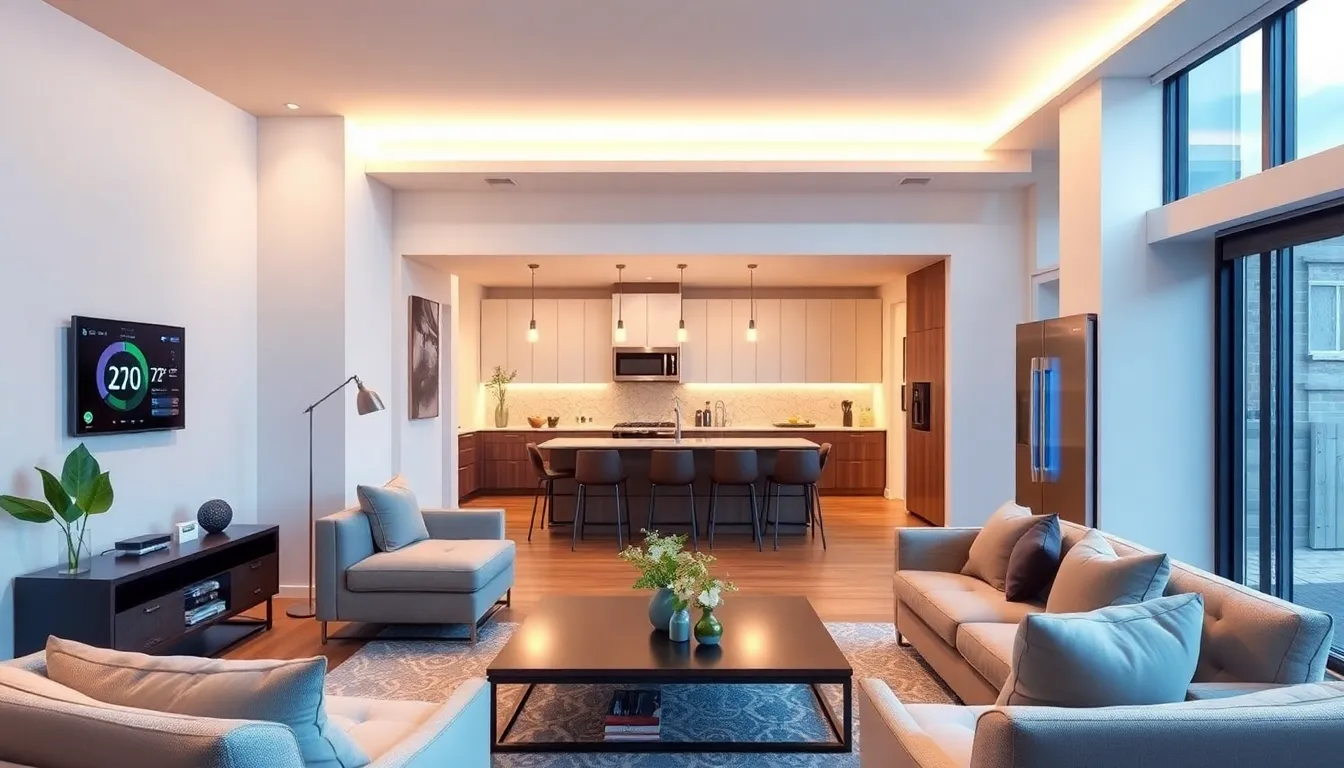Imagine walking into your home and having it greet you like an old friend. Custom smart homes are revolutionizing the way people live, blending technology and comfort into one seamless experience. With the ability to control everything from lighting to security with just a tap on your phone, these homes aren’t just smart—they’re genius.
Table of Contents
ToggleUnderstanding Custom Smart Homes
Custom smart homes integrate technology to enhance comfort and improve daily living. These residences allow homeowners to personalize various features, emphasizing both convenience and security.
Definition and Features
Custom smart homes represent residential spaces designed for specific needs and preferences. Homeowners can connect lighting, heating, and security systems. Smart appliances integrate seamlessly, providing automation and monitoring. Custom interfaces enable easy adjustments through smartphones or voice commands. Advanced features include energy management systems and home entertainment setups. Customization options cater to aesthetics, layout, and technology, ensuring each home reflects its owner’s unique style.
Benefits of Customization
Customization offers numerous advantages, enhancing homeowner satisfaction. Personalized features increase comfort and meet specific lifestyle preferences. Homeowners can optimize energy efficiency through tailored systems, leading to reduced utility bills. Enhanced security options, including cameras and alarms, offer peace of mind. Custom designs improve functionality by adapting spaces to individual needs, whether for entertaining or relaxing. Moreover, increased property value results from well-implemented smart technologies.
Key Technologies in Custom Smart Homes

Custom smart homes rely on several core technologies to deliver seamless living experiences. These technologies enable homeowners to manage their environments efficiently and intuitively.
Smart Devices and Appliances
Smart devices and appliances serve as the backbone of custom smart homes. Smart thermostats adjust temperatures based on occupancy patterns, enhancing comfort and energy savings. Smart refrigerators monitor food supplies, sending alerts when items run low. Security cameras, equipped with motion detection, provide real-time surveillance and alerts to homeowners. Smart lighting systems allow users to customize brightness and color based on preferences or time of day. Integration across devices ensures smooth interactions and interconnectivity, which support enhanced convenience and functionality.
Home Automation Systems
Home automation systems facilitate centralized control of various home functions. These systems connect devices through a unified platform, allowing homeowners to set schedules for HVAC systems, lights, and security features. Voice-activated assistants simplify control, enabling hands-free operation of multiple devices. Automation triggers can adapt based on specific events, such as automatically locking doors at bedtime or adjusting heating when everyone leaves the house. Enhanced user interfaces offer intuitive operations, ensuring that technology aligns with lifestyle needs.
Designing Your Custom Smart Home
Designing a custom smart home involves careful planning, expert consultation, and strategic integration with existing structures.
Planning and Consultation
Planning a custom smart home starts with a comprehensive consultation. Experts assess the homeowner’s specific needs, preferences, and lifestyle. During this stage, prioritize the technologies desired, such as energy-efficient systems and security features. Discussing budget constraints helps tailor solutions that fit financial capabilities. Collaborating with experienced architects and smart home professionals ensures all aspects of the design align with the functionality aimed at enhancing daily living. Successful planning sets the foundation for creating a personalized environment where comfort and technology coexist seamlessly.
Integrating with Existing Structures
Integrating smart technology into existing structures requires thoughtful consideration. First, evaluate the current wiring and layout for compatibility with smart devices. Adjusting infrastructure may enhance functionality while maintaining aesthetic appeal. Homeowners can choose to retrofit older systems or replace them with smart alternatives, depending on needs. Efforts focus on ensuring that new installations blend with the home’s original design, maintaining visual cohesion. Incorporating smart home hubs allows centralized control, making it easier to manage new technologies without overwhelming existing systems. Integration promotes efficiency, boosting energy savings and enhancing overall home automation.
Security Considerations for Custom Smart Homes
Securing a custom smart home requires careful attention to privacy and device selection. Understanding these aspects enhances overall safety and user confidence.
Protecting Your Privacy
Privacy protection within smart homes starts with encrypting data transmissions. Users should leverage strong passwords for accounts linked to smart devices. Regularly updating software and firmware largely reduces vulnerabilities. Installing firewalls offers an additional layer of security, creating barriers against unauthorized access. Monitoring privacy settings on devices ensures that only necessary data gets collected. Homeowners should be mindful of the information shared with third-party services. By doing this, they maintain control over personal data and safeguard against potential breaches.
Choosing Secure Devices
Selecting secure devices involves assessing manufacturer credibility and security features. Homeowners should prioritize brands known for robust security practices. Reading customer reviews and expert analyses enhances understanding of a device’s reliability. Look for devices featuring two-factor authentication, as it adds significant protection. Regular firmware updates from manufacturers are essential, ensuring any discovered vulnerabilities are promptly addressed. Additionally, compatibility with smart home networks influences overall security; devices should operate seamlessly within a secure ecosystem. Prioritizing these factors leads to a safer and more secure smart home environment.
Custom smart homes represent a significant leap in modern living. By merging technology with personal preferences they offer unparalleled convenience and comfort. Homeowners can tailor their environments to fit their lifestyles while enjoying enhanced security and energy efficiency.
As smart technology continues to evolve the potential for customization expands. This adaptability not only improves daily routines but also increases property value. With thoughtful planning and expert guidance homeowners can create spaces that reflect their unique needs and aspirations.
Ultimately custom smart homes stand at the forefront of a new era in residential living where technology and comfort work hand in hand to create a truly personalized experience.



